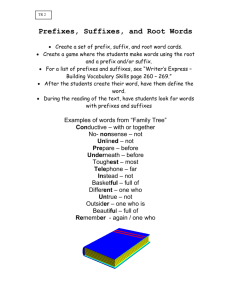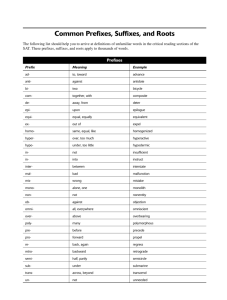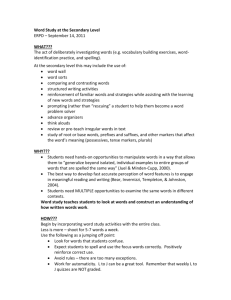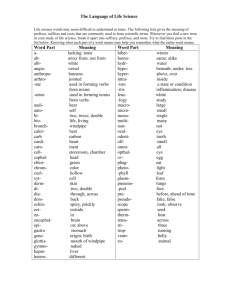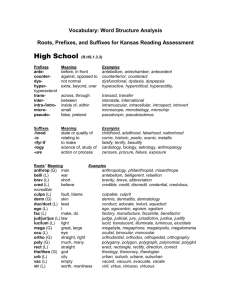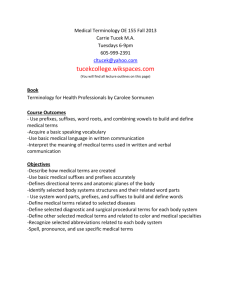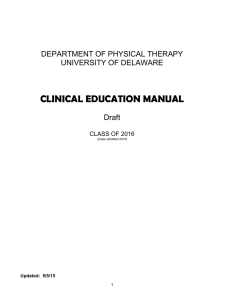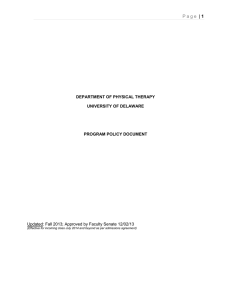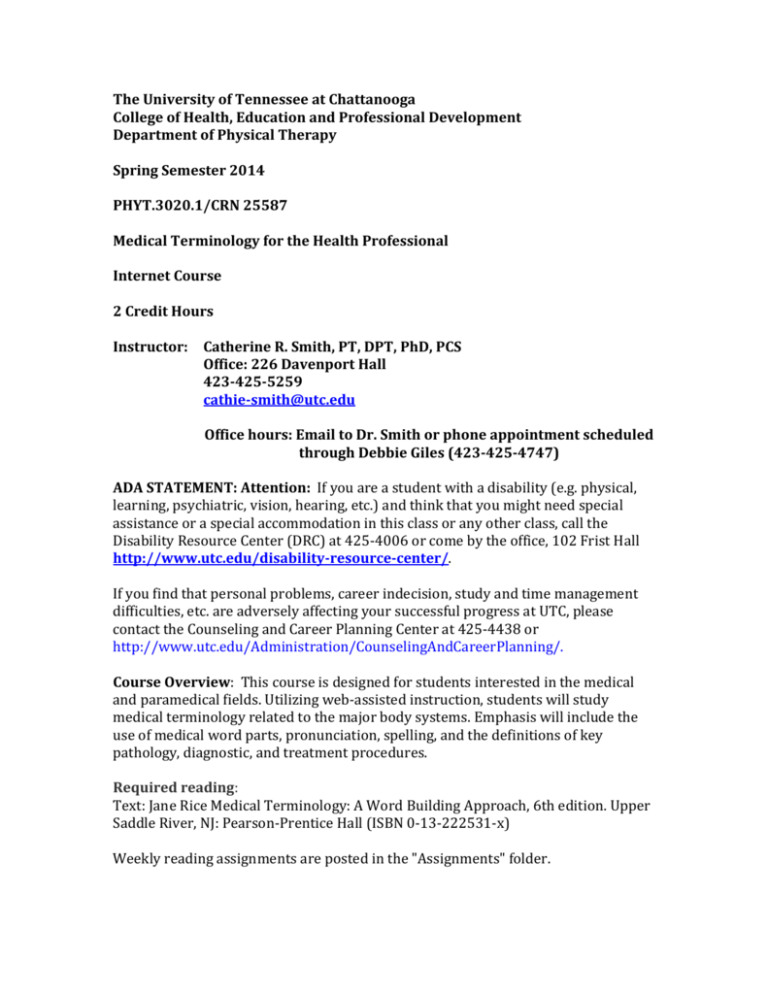
The University of Tennessee at Chattanooga
College of Health, Education and Professional Development
Department of Physical Therapy
Spring Semester 2014
PHYT.3020.1/CRN 25587
Medical Terminology for the Health Professional
Internet Course
2 Credit Hours
Instructor:
Catherine R. Smith, PT, DPT, PhD, PCS
Office: 226 Davenport Hall
423-425-5259
cathie-smith@utc.edu
Office hours: Email to Dr. Smith or phone appointment scheduled
through Debbie Giles (423-425-4747)
ADA STATEMENT: Attention: If you are a student with a disability (e.g. physical,
learning, psychiatric, vision, hearing, etc.) and think that you might need special
assistance or a special accommodation in this class or any other class, call the
Disability Resource Center (DRC) at 425-4006 or come by the office, 102 Frist Hall
http://www.utc.edu/disability-resource-center/.
If you find that personal problems, career indecision, study and time management
difficulties, etc. are adversely affecting your successful progress at UTC, please
contact the Counseling and Career Planning Center at 425-4438 or
http://www.utc.edu/Administration/CounselingAndCareerPlanning/.
Course Overview: This course is designed for students interested in the medical
and paramedical fields. Utilizing web-assisted instruction, students will study
medical terminology related to the major body systems. Emphasis will include the
use of medical word parts, pronunciation, spelling, and the definitions of key
pathology, diagnostic, and treatment procedures.
Required reading:
Text: Jane Rice Medical Terminology: A Word Building Approach, 6th edition. Upper
Saddle River, NJ: Pearson-Prentice Hall (ISBN 0-13-222531-x)
Weekly reading assignments are posted in the "Assignments" folder.
2
PHYT 3020: Spring 2014
Method of Instruction: This web-based course will utilize required reading, webbased study sessions, and faculty and student interaction via e-mail. This course is
an independent study course, taught entirely on Blackboard. Students are
required to complete a weekly quiz for the assigned reading and a final
comprehensive examination administered on campus.
Grading Policies:
Method of Evaluation:
o 1) 15 Web-Based Unit quizzes
by established weekly deadlines
o
o 2) Comprehensive Final Exam (multiple choice exam proctored on site (UTC or
other institution)
o 3) Quizzes and examinations are timed. If the student does not complete the exam
in the allotted time, a deduction will occur in the form of one point per
minute of time. For example, if the student uses 63 minutes to complete a 60minute exam, then there will be a 3-point deduction from the student’s grade
for that particular exam.
o 4) Students will have from Monday to Thursday to complete the
examination/quiz for a given assignment within the corresponding week.
o 5) If a student cannot complete the exam by Thursday (11:55 pm) due to technical
difficulties, then the quiz must be completed as soon as possible with special
permission by the instructor. Any questions missed on the previous attempt
will carry forward to the subsequent attempt. For example, if a student
attempts the exam on Thursday and misses one question, but cannot
complete the exam and it is their first episode of technical difficulty, and then
the instructor will make the quiz available. The missed question from the
previous attempt will carry forward to the next quiz. All attempts must be
completed by Friday of the corresponding quiz week. To ensure that students
contact the instructor immediately, there is a 10% penalty for every day that
the student waits for re-attempt. For example, if the student's first attempt is
Tuesday and he/she contacts the instructor immediately, there is 0% late
penalty (deductions for previously missed questions will occur). If the
student waits until Wednesday to contact the instructor there is a 10%
penalty and deductions for previously missed items will still occur.
Grade Distribution:
o Quizzes 60%
o Final Exam 40%
Course Grading Scale:
A=90-100; B=80-89; C=70-79; D=60-69; F=below 60
PHYT 3020: Spring 2014
3
Class Attendance: Class attendance is NOT optional. If you miss an assignment,
quiz, test, or exam because of a justifiable, excused absence as determined by the
department head, permission to make up the work at a later date must be obtained
from the course instructor. Permission to take make-up quizzes, tests, or exams will
not be given for an unexcused absence.
o
Changes to this syllabus may be made at the discretion of the professor. All
changes will be announced on Blackboard
Course Objectives: Upon completion of this course, the student should be able to:
o 1. Identify and define word parts most frequently associated with the 12 major
body systems.
o 2. Properly spell, define, and pronounce medical terms associated with each of
these body systems.
o 3. Define unfamiliar medical terms by analyzing the word parts and verifying the
definition in your dictionary.
o 4. Use the Internet to locate information about specific medical conditions.
Course Goals:
1. Understand fundamental word structure.
o 2. Recognize how suffixes and prefixes are used when building medical words.
o 3. Analyze, build, spell, and pronounce medical words.
o 4. Define terms that describe the body and its structural units.
o 5. List the systems of the body and give the organs in each system.
o 6. Identify and define selected abbreviations.
o 7. Define terms that are used to describe direction, planes, and cavities of the
body.
o 8. Describe the structure and the function of the skeletal system.
o 9. Describe the organs and the function of the muscular system.
o 10. Describe the organs and the function of the cardiovascular system.
o 11. Describe the components and the function of the blood.
o 12. Describe the organs and the function of the respiratory system.
o 13. Describe the organs and the functions of the urinary system.
o 14. Describe the primary glands and function of the endocrine system.
o 15. Describe the organs and the function of the nervous system.
o 16. Describe the organ and the functions of the ear.
o 17. Describe the organ and the functions of the eye.
18. Describe the organs and the functions of reproduction.
Course Outline and Weekly Learning Objectives
o Week 1: Fundamental Word Structure and Suffixes
o • Describe the fundamental elements that are used to build medical words.
o • List three guidelines that will assist you with the identification and spelling of
medical words.
PHYT 3020: Spring 2014
4
o
o
o
o
o
o
• Explain the use of abbreviations when writing and documenting data.
• Recognize how suffixes are used when building medical words.
• Identify adjective, noun, and diminutive suffixes.
• Be aware of suffixes that have more than one meaning.
• Recognize suffixes that pertain to pathological conditions.
• Identify selected suffixes common to surgical and diagnostic procedures.
o
o
o
o
o
o
o
o
o
o
Week 2: Prefixes and Organization of the Body
• Recognize how prefixes are used when building medical words.
• Identify prefixes that are commonly used in medical terminology.
• Be aware of prefixes that have more than one meaning.
• Recognize prefixes that pertain to position or placement.
• Identify selected prefixes that pertain to numbers and amounts.
• Define terms that describe the body and its structural units.
• List the systems of the body and give the organs in each system.
• Define terms that are used to describe direction, planes, and cavities of the body.
• Understand word analysis as it relates to Head-to- Toe Assessment.
Weeks 3–15:
• Describe the body system and all related structures.
• List the functions of the body system.
• Describe body system differences from the child to the older adult.
• Analyze, build, spell, and pronounce medical words listed in the chapter.
• Review Drug Highlights presented in the chapter.
• Provide the description of diagnostic and laboratory tests related to the body
system.
o • Identify and define selected abbreviations related to the body system.
o • Describe each of the conditions presented in the Pathology Spotlights.
o • Review the Pathology Checkpoint.
o
o
o
o
o
o
o
Course Outline: Weekly Quizzes will be available as announced.
o Week: Chapter and Subject:
o Week 1 Chapters 1 & 2—Fundamental Word Structure, Suffixes
o Week 2 Chapters 3 & 4—Prefixes, Organization of the Body
o Week 3 Chapter 5—Integumentary System
o Week 4 Chapter 6—Skeletal System
o Week 5 Chapter 7—Muscular System
o Week 6 Chapter 8—Digestive System
PHYT 3020: Spring 2014
o Week 7 Chapter 9—Cardiovascular System
o Week 8 Chapter 10—Blood and Lymphatic System
o Week 9 Chapter 11—Respiratory System
o Week 10 Chapter 12—Urinary System
o Week 11 Chapter 13—Endocrine System
o Week 12 Chapter 14—Nervous System
o Week 13 Chapter 15 & 16—The Ear, The Eye
o Week 14 Chapters 17 & 18—Female Reproductive System, Obstetrics
o Week 15 Chapters 19 & 20—Male Reproductive System, Oncology
Comprehensive Final Exam: to be scheduled during the week of finals.
5

